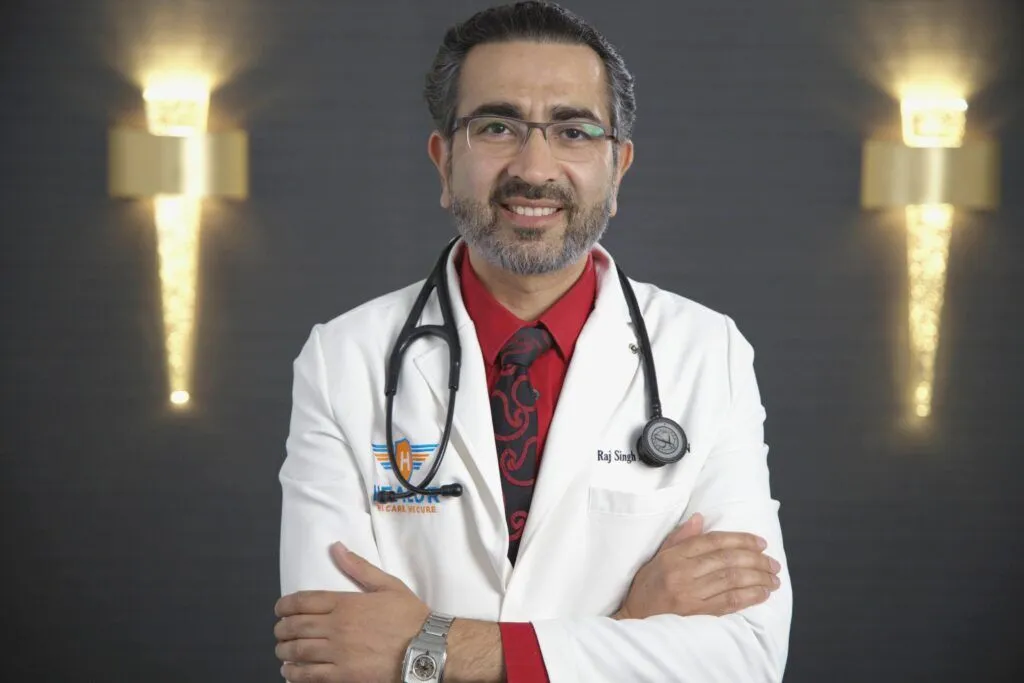
Cholesterol is a waxy material found in the blood that your body needs to build healthy cells. However, having high levels of cholesterol increases your risk of heart disease. High cholesterol levels cause you to develop fatty deposits in your blood vessels, which make it hard for your blood to flow through your arteries. Sometimes, this will cause them to break suddenly and form a clot that can cause either a heart attack or stroke.
Some people wonder if high cholesterol is based on genetics. While high cholesterol can be inherited, it most often is caused by eating a lot of high cholesterol foods, such as cheese and shellfish. At HEALOR™, Dr. Raj Singh helps his patients in Las Vegas, NV treat high cholesterol. A healthy diet and regular exercise help you reduce your high cholesterol.
What causes high cholesterol?
Cholesterol is carried through your blood, and then it will attach to proteins. This is known as a lipoprotein. There are different types of cholesterol that are based on what the lipoprotein carries, including:
- Low-density lipoprotein (LDL): LDL or “bad” cholesterol transports cholesterol particles in the body. It can build up on the walls of your arteries, which makes them hard and narrow. This makes them more susceptible to breaking.
- High-density lipoprotein (HDL): HDL or “good” cholesterol picks up any excess cholesterol and brings it to the liver so it can be removed from your body.
A lipid profile measures triglycerides, a fat in the blood. Having a high triglyceride level increases your risk of heart disease. There are some factors that you can control to keep your cholesterol low, including living an active life, eating a healthy diet, and maintaining a healthy weight. However, even after doing those things, your genetics may make you more likely to keep cells from removing LDL cholesterol efficiently, leading to high cholesterol.
Diagnosing high cholesterol
At HEALOR™, we use a blood test known as a lipid panel to check cholesterol levels in our patients in Las Vegas, NV. This test will show us your total cholesterol, LDL cholesterol, HDL cholesterol, and triglycerides. Dr. Singh recommends you do not eat or drink anything (other than water) for 9 – 12 hours before a blood sample is taken.
Your cholesterol levels are measured in milligrams of cholesterol per deciliter of blood. The ideal total cholesterol levels are below 200 mg/dL. The best levels are below 100 mg/dL for LDL cholesterol and below 70 mg/dL for those that are at risk for diabetes or heart disease. The best HDL cholesterol reading is 60 mg/dL and above.
High cholesterol treatment
If Dr. Singh diagnoses you with high cholesterol after your blood results at HEALOR™, he will make lifestyle change suggestions. However, if you have made these important lifestyle changes and your cholesterol levels remain high, he may recommend medication. Dr. Singh uses statins, bile-acid-binding resins, cholesterol absorption inhibitors, fibrates, niacin, and injectable medications to help treat high cholesterol.
How to lower high cholesterol
The same heart-healthy lifestyle choices that help lower your cholesterol can help you to prevent getting it at all. To help prevent high cholesterol, you should:
- Limit salt and eat fresh fruits, vegetables, and whole grains
- Refrain from eating a lot of animal fat and have good fats in moderation
- Quit smoking
- Exercise for at least 30 minutes at least four days a week
- Drink alcohol in moderation
Learn your cholesterol levels at an annual wellness visit
When you want to know your cholesterol levels, schedule a lipid profile at HEALOR™. Dr. Raj Singh can read your blood test results and diagnose high cholesterol or other manageable diseases that may be affecting your overall health. To schedule this blood test, call our Las Vegas, NV, office today.




